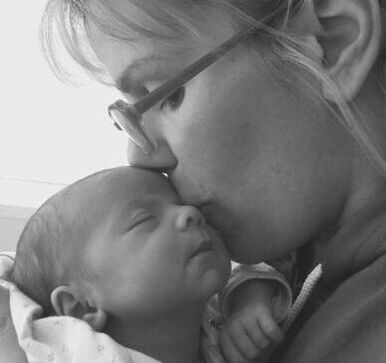|
|
Some Helpful Tips for New Moms!
1. Snuggle
I think all moms would agree with this one. Snuggle lots and lots. Babies love to be snuggled - feeling warm and secure, and hearing your heartbeat (which they've been listening to for the last nine months). Plus it encourages bonding between you and your baby. Be sure to get Daddy in on the snuggling too! They grow so fast so enjoy this time as much as you can!
I think all moms would agree with this one. Snuggle lots and lots. Babies love to be snuggled - feeling warm and secure, and hearing your heartbeat (which they've been listening to for the last nine months). Plus it encourages bonding between you and your baby. Be sure to get Daddy in on the snuggling too! They grow so fast so enjoy this time as much as you can!
2. Bathing baby
Giving baby a bath isn't really necessary in the first few weeks and can be scary for them. They are so use to be in a tight space that being undressed and not held close, can be traumatic. A wet warm cloth can be used to wash them down an area at a time without completely uncovering them. My babies would even sometimes sleep through it. Gently washing their eyes (inner corner to outer corner to avoid infection), face, ears, head, neck, and then washing their bottom, being careful to clean out all the little crevices.
Follow that with cord care (gently cleaning the cord area with a Q-tip moistened with alcohol), and that's it!
3. Stock up on food before the baby is born
Frozen meals, fast or easy meals (lots of cereal, pasta, etc.), and snacks are so nice to have around when you're either too tired to cook, or baby is crying, or you need to get off your feet because you're supposed to be recovering. Even if you know you'll have family or friends helping you out with meals, it's still nice to have some backups, and food for breakfast, lunch, and snacks.
4. Crying
Your baby's main mode of communication is crying.So don't panic when they cry. If you can stay calm and check all the things to find what your baby needs it will help your baby to calm down also. Check the obvious things such as.....diaper or if its time for baby to eat. If it isn't any of those then your baby may just want to be cuddled a bit. Some babies struggle with colic (gas) at an early age. One sign is if they are pulling their knees to their chest when they cry. If the pattern continues your baby may have colic. Keeping the baby bundled and warm can help. There are many gas remedies you can buy for babies that can be helpful also.
2. Bathing baby
Giving baby a bath isn't really necessary in the first few weeks and can be scary for them. They are so use to be in a tight space that being undressed and not held close, can be traumatic. A wet warm cloth can be used to wash them down an area at a time without completely uncovering them. My babies would even sometimes sleep through it. Gently washing their eyes (inner corner to outer corner to avoid infection), face, ears, head, neck, and then washing their bottom, being careful to clean out all the little crevices.
Follow that with cord care (gently cleaning the cord area with a Q-tip moistened with alcohol), and that's it!
3. Stock up on food before the baby is born
Frozen meals, fast or easy meals (lots of cereal, pasta, etc.), and snacks are so nice to have around when you're either too tired to cook, or baby is crying, or you need to get off your feet because you're supposed to be recovering. Even if you know you'll have family or friends helping you out with meals, it's still nice to have some backups, and food for breakfast, lunch, and snacks.
4. Crying
Your baby's main mode of communication is crying.So don't panic when they cry. If you can stay calm and check all the things to find what your baby needs it will help your baby to calm down also. Check the obvious things such as.....diaper or if its time for baby to eat. If it isn't any of those then your baby may just want to be cuddled a bit. Some babies struggle with colic (gas) at an early age. One sign is if they are pulling their knees to their chest when they cry. If the pattern continues your baby may have colic. Keeping the baby bundled and warm can help. There are many gas remedies you can buy for babies that can be helpful also.
5. Get out of the house
It feels great to get to sit around in your sweats all the time. But only for so long before you'll probably start to go a little crazy. After a week of basically just sitting around all day (you'll be doing lots of sitting with as often as newborns eat!) You may want to get out of the house. Obviously, you still need to be taking it easy - you just had a baby! - but maybe take baby for his first walk around the neighborhood. Or maybe just go for a drive. Or leave baby home with Daddy and go to the grocery store, or spoil yourself with a pedicure. Just something so that you have to shower, and get dressed, and feel slightly more human again, and get a little change of scene. For me it helped me deal with the new mommy blues!
6. Baby yourself a little
Whether you've had a c-section or a vaginal birth, your body has been through a rough time; your hormones are all over the place; and your lack of sleep is not helping matters! Keep a few things handy like water bottles, granola bars, minty gum, hand sanitizer, diapers, baby wipes, burp rags, and, most importantly, chocolate! Maybe keep these things in a basket in range of your nursing area.
Take showers when you can. Accept casseroles and other offerings of meals from friends. If you don’t have help for the housework, just do the bare minimum so you can rest and recover and focus on getting to know your sweet new baby!
7. Sleep when your baby sleeps
This will be a life saver for you in these early months.Even if you only sleep a half hour, it can help you cope with everything.
Also give your baby a 3 hour nap limit. Don't let baby sleep longer than three hour stretches during the day. Babies are almost always more nocturnal when they're born, and this will usually help sort that out, and encourage their longer stretches of sleep to be at night.
|
|
8. Strategically place pacifiers and burp cloths
You don't want to have to go hunting for them in the middle of the night, or when you're covered in spit up, or when you're just feeling too tired to get up and find one. I keep a pacifier in the crib, the bouncer and the diaper bag. Keep a burp rag on hand anywhere you feed the baby -the rocking chair, on the couch, and in the diaper bag for when you go out, etc.
9. Learn how to swaddle
Babies are used to being all warm and snug in the womb. They'll sleep much better all swaddled tight. Birth is a huge transition for a baby! From a warm, dark, weightless environment where all their needs are met, sounds are muffled, and mama’s heartbeat lulls them to sleep, they are abruptly ejected into a cold, loud, bright world where they experience hunger and discomfort and loneliness and fear for the first time. You can help your little one cope by easing the transition for him/her. There are lots of different types of swaddle blankets that you can buy at baby stores, but I feel like they're usually overpriced, especially when a regular receiving blanket will do the trick.
10. Invest in a sling and/or bouncer seat
My babies have loved their bouncer seats. The slings are a great way to keep them feeling snuggled, and keep them close, but still have your hands free for a little while. Even as tiny as they are, your arms do start to get tired after holding them for hours. The bouncer is great for when you just need a little break, or need to take care of an older child, or cook at the stove, etc..
Here are a few sling and bouncer options, if you are looking.
11. Don't give up on breastfeeding
It's hard, especially if this is your first baby, or this baby just doesn't seem to be figuring it out. But it can take a little time, so don't give up too quickly. Give it at least a few weeks, and talk to your doctor or a lactation consultant if you have serious concerns that your baby's not getting enough milk, or if there seem to be other problems.
Expect your little one to eat erratically right at first.Their tummies are only about the size of a walnut in the first days, so they can’t eat enough at a feeding to last them more than two or three hours at most, and often far less!
But the benefits of breastfeeding, both physically and emotionally for both you and baby, are so worth it if you're able to do it!
12. Don't be afraid to ask for help
Have your mom or sister or a friend to talk to for support. It really helps to have someone to give advice or just to listen.Make sure and follow your own instincts about what is right for your baby though. Just because someone gives advice doesn't mean that you have to take it. It is a learning time for you and you will know what is right for you and your baby.
13. Baby your marriage
This is a huge, huge, huge change for you and your husband, so be patient with each other! You are going from ‘the two of us’ to ‘we three’ and, just as with anything else, change isn't easy. You are having to deal with becoming a mommy, and your body has been through an incredible transition during the previous nine months followed by the trauma of labor and delivery followed by crashing hormones. The trials of learning to breastfeed (or deal with engorgement issues if choosing to bottle feed), and the exhaustion of dealing with a newborn’s erratic sleep patterns. If you had a c-section, you can add major abdominal surgery to that list! So, husbands, put your own issues aside and baby your wife and baby for the time being! Wives, a little verbal acknowledgement goes a long way with husbands, so try to muster up enough energy to tell your husband that you appreciate him and understand that he is trying to figure out this new life just like you are, and assure him that eventually you will be you again!
Postpartum Depression
Many women have never even heard of postpartum depression. They don't understand what is happening to them, or why they are sad or struggling, when they have a beautiful baby and everything should be fine. Because people think that having a baby is a joyous experience, but as many as 70 - 80% of women can feel sad, anxious, and overwhelmed after childbirth.
I am very thankful to not have had to deal with this but a very close friend of mine had a very hard time. I am making this page in dedication to her and what she went through, because she had no idea what was happening or what was wrong with her. I just want to try and prevent this by helping women to be educated about it!
Adjusting to life as a mother can be difficult. Most women will experience what is commonly called "Baby Blues" but for some it goes beyond that. For the majority of women, these are temporary feelings that resolve in about one week. Postpartum blues or "baby blues" are considered a normal response to the fluctuations in hormone levels and adjusting to your new life after the birth of your baby. But if these feelings persist or get worse you may have Postpartum Depression. As many as 80% of first time mothers experience postpartum blues. Symptoms can start as soon as right after giving birth, as the hormones of pregnancy suddenly drop and you are adjusting to taking care of a new baby with constant demands. Many mothers will have periods of elation and joy, followed by despondency and depression. These drastic mood swings are much easier to manage if mom realizes they are based on hormonal shifts and fatigue!
Postpartum depression is something which affects between 10 to 15 in every 100 women having a baby. The symptoms are similar to those in depression at other times. These include low mood and other symptoms lasting at least two weeks. Depending on the severity, you may struggle to care for yourself and your baby. You may find simple tasks difficult to manage. Most of the time there is no obvious reason for it. It can often be related to hormones.You may feel distressed, or guilty for feeling like this, as you expected to be happy about having a baby but postpartum depression can happen to anyone and it is not your fault. It's never too late to seek help! Even if you have been depressed for a while, you can get better!The help you need depends on how severe your illness is, mild depression can be helped by simply increasing support from family and friends.
Many women have never even heard of postpartum depression. They don't understand what is happening to them, or why they are sad or struggling, when they have a beautiful baby and everything should be fine. Because people think that having a baby is a joyous experience, but as many as 70 - 80% of women can feel sad, anxious, and overwhelmed after childbirth.
I am very thankful to not have had to deal with this but a very close friend of mine had a very hard time. I am making this page in dedication to her and what she went through, because she had no idea what was happening or what was wrong with her. I just want to try and prevent this by helping women to be educated about it!
Adjusting to life as a mother can be difficult. Most women will experience what is commonly called "Baby Blues" but for some it goes beyond that. For the majority of women, these are temporary feelings that resolve in about one week. Postpartum blues or "baby blues" are considered a normal response to the fluctuations in hormone levels and adjusting to your new life after the birth of your baby. But if these feelings persist or get worse you may have Postpartum Depression. As many as 80% of first time mothers experience postpartum blues. Symptoms can start as soon as right after giving birth, as the hormones of pregnancy suddenly drop and you are adjusting to taking care of a new baby with constant demands. Many mothers will have periods of elation and joy, followed by despondency and depression. These drastic mood swings are much easier to manage if mom realizes they are based on hormonal shifts and fatigue!
Postpartum depression is something which affects between 10 to 15 in every 100 women having a baby. The symptoms are similar to those in depression at other times. These include low mood and other symptoms lasting at least two weeks. Depending on the severity, you may struggle to care for yourself and your baby. You may find simple tasks difficult to manage. Most of the time there is no obvious reason for it. It can often be related to hormones.You may feel distressed, or guilty for feeling like this, as you expected to be happy about having a baby but postpartum depression can happen to anyone and it is not your fault. It's never too late to seek help! Even if you have been depressed for a while, you can get better!The help you need depends on how severe your illness is, mild depression can be helped by simply increasing support from family and friends.
When Does Postpartum Depression Happen?
The timing varies. It often starts within the first month after giving birth. It can start several months after having a baby. About 1/3 of women with postpartum depression have symptoms which started in pregnancy and continue after birth.
What does it feel like to have postpartum depression?
You may have some or all of the these symptoms:
Depression-
You feel sad, unhappy and tearful a lot of the time. Thinking at times that you cannot go on. You may notice that you feel worse at certain times of the day, like mornings or evenings.
Irritable-
You may get irritable or angry with your partner, baby or other children.
Tiredness-
All new mothers get pretty tired. Depression can make you feel utterly exhausted and lacking in energy.
Sleeplessness-
Even though you are tired, you can't fall asleep. You may lie awake worrying about things. You wake during the night even when your baby is asleep. You may wake very early, before your baby wakes up.
Appetite changes-
You may lose your appetite and forget to eat. Some women eat for comfort and then feel bad about gaining weight.
Unable to enjoy anything-
You find that you can't enjoy or be interested in anything. You may not enjoy being with your baby.
Loss of interest in sex-
There are several reasons why you lose interest in sex after having a baby. It may be painful or you may be too tired. Feeling depressed can take away normal desires. Your partner may not understand this and feel rejected.
Negative and guilty thoughts-
Depression changes your thinking:
You might think that you are not a good wife or mother, or that your baby doesn't love you.
You may feel guilty for feeling like this or that this is your fault.
You may lose your confidence.
You might feel like you can't cope with things.
Anxiousness-
Most new mothers worry about their babies' health. If you have postpartum depression, the anxiety can be overwhelming.
You may worry that:
Your baby is ill.
Your baby is not gaining enough weight.
Your baby is crying too much and you can't calm them.
Your baby is too quiet and might have stopped breathing.
You might harm your baby.
Your depression will never get better.
You may be so worried that you are afraid to be left alone with your baby, for fear that you might hurt them. You may need
re-assurance from your partner or doctor.
Avoiding other people-
You may not want to see friends and family. You might find it hard to go to postnatal support groups.
Hopelessness-
You may feel that things will never get better. You may think that life is not worth living. You may even wonder whether your family would be better off without you.
Please know that all of these thoughts and feelings, you may be having, are your hormones playing with your emotions. There is HOPE and you can get help! I hope that something on this page will be encouraging and helpful to you or someone you may know.
Here is a very nice video that I found from a lady named Jennifer Conner. In this video she shares her experiences with postpartum depression. I think hearing from someone on a personal level can help even more than just reading about it. Thank you for sharing Jennifer!
You can visit her page at (www.facebook.com/jenncofit)
You can visit her page at (www.facebook.com/jenncofit)
Ways you can help yourself:
1. Don't be frightened by the diagnosis. Many women have postnatal depression, you will get better in time! Your partner, friends or family can be more helpful and understanding if they know what the problem is.
2. Tell someone about how you feel. It can be a huge relief to talk to someone understanding. This may be your partner, a relative or friend. If you can't talk to your family or friends, talk to your midwife or doctor. They will know that these feelings are common and will be able to help.
3. Make sure you eat regularly, even if you don't feel like eating. Eat healthy food.
4. Let others help you with housework, shopping and looking after other children.
5. Take every opportunity to get some sleep or rest during the day or night. If you have a helpful partner, relative or friend, ask them to feed the baby at night sometimes. You can use your own expressed breast milk, or formula milk for this. If you are on your own, try and rest when the baby sleeps.
6. Get some exercise. Ask your health adviser if there are any mother and baby exercise classes in your area. Walking with your baby in the stroller is good exercise. Regular exercise can boost your mood.
7. Find time for yourself to do things you enjoy or help you relax - e.g. go for a walk, read a magazine, listen to music. If you have a partner, do try to enjoy some time together. If you are a single mother, try to do something enjoyable with a friend or family member.
8.Try going to local groups for new mothers or postnatal support groups. Your health visitor can tell you about groups in your area. You may not feel like going to these groups if your are depressed. See if someone can go with you. You may find the support of other new mothers helpful. You may find some women who feel the same way as you do.
9. Don't blame yourself, your partner or close friends or relatives. Life is tough at this time, and tiredness and irritability can lead to fighting.
10. Don't turn to alcohol or drugs. They may make you feel better for a short time, but it doesn't last. Alcohol and drugs can make depression worse. They can also damage your physical health.
Natural Remedies
There are some things that you can take that may help you through this time. You can discuss these options with your Dr or care giver.
SAM-e -
SAM-e, pronounced "sammy", is short for S-adenosyl-L-methionine. It's a chemical that's found naturally in the human body and is believed to increase levels of neurotransmitters serotonin and dopamine. Several studies have found SAM-e is more effective than placebo. SAM-e is available as an over-the-counter supplement in health food stores, drug stores, and online. It should be enteric-coated for maximum absorption. Although it's one of the more expensive supplements, it remains popular as a remedy for depression.
Omega-3 fatty acids-
Omega-3 fatty acids are a type of good fat needed for normal brain function. Our bodies can't make omega-3s on their own, so we must obtain them through our diet. Studies have linked depression with low dietary intake of omega-3 fatty acids. In countries with higher fish consumption, such as Japan and Taiwan, the depression rate is 10 times lower than in North American. Postpartum depression is also less common. Studies suggest that omega-3's together with antidepressants may be more effective than antidepressants alone.
St. John's Wort-
The herb St. John's wort has long been used in folk medicine for sadness, worry, nervousness, and poor sleep.
Today, the results of over 20 clinical trials suggest that St. John's wort works better than a placebo and is as effective as antidepressants for mild to moderate depression, with fewer side effects. Studies suggest that St. John's wort is not effective for major depression. It's available at health food stores, drug stores, and online in the form of capsules, tablets, liquid extracts, or tea.
Folic Acid-
Folic acid, also called Folate, is a B vitamin that is often deficient in people who are depressed. Folate is found in green leafy vegetables, other vegetables, fruit, beans, and fortified grains. It's one of the most common vitamin deficiencies because of poor diet but also because chronic conditions and various medications such as aspirin and birth control pills can also lead to deficiency. Besides food, folic acid is also available as a supplement or as part of a B-complex vitamin. Increasing vitamin B-6 and Magnesium has also been said to be helpful. Also exercise and sunlight can help fight all types of depression. So find a few minutes to step out side for a short stroll.
DISCLAIMER : Nothing on this site is meant in any way to be medical advice! Any questions or problems you may have, should be discussed with your caregiver! Thanks!
|
|










